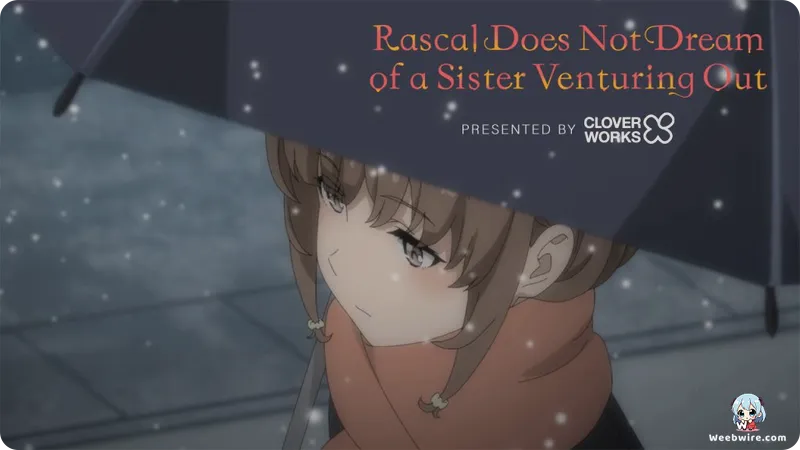Unveiling Kaede's Heart: 'Rascal Does Not Dream of a Sister Venturing Out' Delivers Powerful Narrative and Deep Psychological Insight

The acclaimed 'Rascal Does Not Dream' saga, celebrated for its unique blend of poignant slice-of-life moments, captivating supernatural mysteries, and deep psychological insights, continues to enthrall global audiences. While many cherish the evolving relationship between Sakuta Azusagawa and Mai Sakurajima, the recent cinematic installment, 'Rascal Does Not Dream of a Sister Venturing Out,' shines a powerful spotlight on one of the series' most emotionally charged narratives: the courageous journey of Kaede Azusagawa. This compelling film, an adaptation of Hajime Kamoshida's eighth light novel volume, is not just another chapter; it's a profound exploration brimming with revelations and intricate details that underscore its widespread critical acclaim and enduring appeal.
Kaede's Courageous Journey to Reclaim Herself
At its core, 'Sister Venturing Out' distinguishes itself by dedicating its entire focus to Kaede, Sakuta's younger sister. Diverging from previous arcs that often introduced new characters grappling with the enigmatic 'Adolescence Syndrome,' this story intimately chronicles Kaede's arduous struggle to reclaim a semblance of normalcy after her own severe encounter with the syndrome. This arc brilliantly exemplifies the series' foundational philosophy: that these supernatural phenomena are often potent metaphors for genuine, deeply personal psychological battles. Kaede's 'Adolescence Syndrome,' which manifested as dissociative amnesia and the emergence of a distinct persona, 'Kaede-chan,' serves as a moving representation of trauma, social anxiety, and the immense challenges of forging an identity during adolescence. The film meticulously portrays her valiant efforts to attend school, cultivate friendships, and reconnect with her past, showcasing the series' unwavering commitment to sensitively and realistically addressing mental health themes.
Sakuta's Evolving Role as a Pillar of Support
The series is widely praised for its incisive, witty dialogue and Sakuta's signature deadpan narration. In 'Sister Venturing Out,' Sakuta's role subtly evolves from principal problem-solver to an unwavering pillar of support. A noteworthy aspect of his character development in this arc is the nuanced growth of his empathy and patience. Though always protective, his shared journey with Kaede compels him to confront his own anxieties regarding her well-being, fostering a deeper understanding of her personal struggle beyond merely seeking a 'cure.' This chapter presents Sakuta at his most vulnerable and authentically human, solidifying his status as one of anime's most relatable protagonists despite his outwardly cynical demeanor. His internal monologues, a hallmark of the series, become profoundly more introspective and heartfelt as he grapples with the potential loss of the 'Kaede-chan' persona he has grown to cherish.

CloverWorks' Masterful Visual Storytelling
Adding another layer of depth, Studio CloverWorks' meticulous animation work truly shines. While the entire 'Rascal Does Not Dream' series is lauded for its visual fidelity and evocative atmospheric settings, 'Sister Venturing Out' stands out for its subtle character expressions and the delicate portrayal of Kaede's fluctuating emotional state. Animators paid extraordinary attention to her body language, her hesitant glances, and her quiet triumphs, all of which significantly amplify the narrative's emotional weight. The strategic use of lighting and color palettes frequently mirrors Kaede's internal world, transitioning from bright, hopeful scenes of progress to more subdued tones reflecting her moments of doubt and fear. This masterful visual storytelling is paramount in conveying the profound depth of her psychological journey without relying solely on dialogue.
Philosophical Depths: Identity and Memory
Furthermore, the series' rich philosophical underpinnings are particularly pronounced within this arc. While not as overtly immersed in quantum mechanics as some previous stories, 'Sister Venturing Out' gracefully explores themes of identity, memory, and the very essence of self. The poignant dilemma of the 'old' Kaede versus the 'new' Kaede prompts both characters and viewers to contemplate what genuinely defines a person's identity: is it their memories, their personality, or a complex interplay of both? This intellectual dimension, seamlessly interwoven into a deeply emotional narrative, is a hallmark of Hajime Kamoshida's exceptional writing and a primary driver of the series' critical triumph. It elevates 'Rascal Does Not Dream' far beyond typical high school romance or supernatural drama, positioning it as a profound meditation on the human experience.
An Enduring Legacy of Empathy and Impact
Ultimately, fan reception to Kaede's arc, both in the light novel and its subsequent film adaptation, has been overwhelmingly positive, frequently cited as one of the most impactful stories across the entire series. This resonates with the powerful impact of character-driven narratives and the deep emotional connection audiences have forged with the Azusagawa siblings. The raw honesty of Kaede's struggle struck a chord with countless individuals who have navigated similar challenges or supported loved ones through mental health journeys. The series' remarkable ability to address such sensitive topics with grace, empathy, and a touch of the extraordinary is a testament to its unparalleled storytelling and its enduring legacy in contemporary anime. The emotional resolution of Kaede's journey, though tinged with bittersweetness, offers profound catharsis, leaving an indelible impression long after the credits roll, and firmly establishing 'Rascal Does Not Dream of a Sister Venturing Out' as a pivotal and unforgettable chapter in the illustrious 'Rascal Does Not Dream' saga.
Credits
Rascal Does Not Dream of a Sister Venturing Out
Author
Hajime Kamoshida
Cover Art
Keiji Mizoguchi
Studio
CloverWorks
Publisher
ASCII Media Works
Producers





